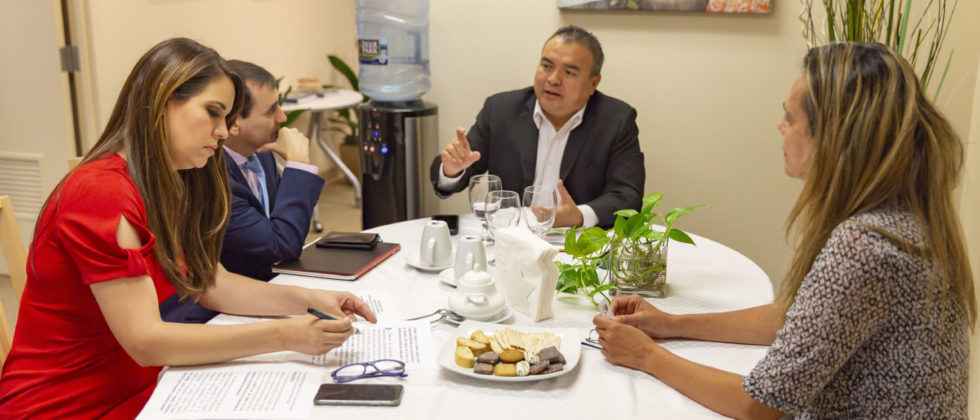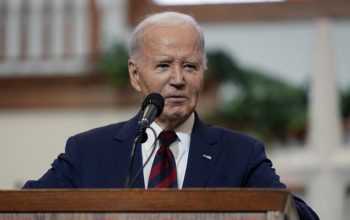news
Global Roundtable interview with Nestor Mendez highlights the lesser known initiatives of the OAS and its future outlook
December 11, 2019
Washington, D.C.- The Organization of American States’ (OAS) Assistant Secretary General Nestor Mendez sat down with the Global Foundation for Democracy and Development’s (GFDD) correspondent and Dominican diplomat, Angie Martinez, for an interview in GFDD’s Global Roundtable series on August 12, 2019. Martinez began with an introduction of Mendez’ many accomplishments as Ambassador of Belize to the United States before becoming part of the OAS’s General Secretariat body.
Martinez mentioned the lesser talked about missions of the OAS such as women’s empowerment, climate change, entrepreneurship and innovation programs among others and asked Mendez to highlight what are the pillars of the OAS’ work and which other areas of work people should get to know better. Mendez acknowledged that there are some topics the OAS is known for, but there are several more initiatives that “because they are not sensationalized, they do not make headlines.”
He went over the 4 guiding pillars; promoting democracy, human rights protection, development and multidimensional security. The first two are the most talk about, but the latter pair are not as well-known even though they are just as important. The development pillar oversees education, employment, tourism, capacitating institutions and young entrepreneurs, climate change and constructing resilience to help people from natural disasters, “all the issues that have to do with the economic and social development elements of our societies and how to help member states grow in this area.” Martinez emphasized that under the pillar of multidimensional security, which Mendez explained covers police, customs, migration, cybersecurity, transnational organized crime, “the region has a serious problem. Latin America makes up approximately 8.5 percent of the planet’s population, yet the homicide rates are triple that of the global average.” Mendez stated that “we (OAS) as an institution are convinced that in order to resolve the problems of violence and crime in our region, it’s not possible to do it exclusively through capacitating more security agents, it’s not possible through building more prisons. We must solve the root problems” such as poverty, lack of opportunity, lack of access to education, and other causes.
Mendez and Martinez also went over the economic funding of the OAS. The Secretariat is currently double checking its flow of funds, accountability and transparency, which are in motion but could be and are being improved. Mendez stated that even though there are low funds, the Secretariat is trying to make sure each body is not reduced in personnel while the mandates are increasing; “we have to enable our people. We have to see how we can accomplish more with the little we have” through being efficient and increasing efficiency.
Martinez asked about the recent 49th General Assembly Medellin, Colombia that took place in June. The main decisions reflect the political climate in the region and 2 resolutions were passed; creating a high-level committee to work alongside the Nicaraguan government to promote dialogue and solutions; and a resolution to tackle the migration of Venezuelans to nearby countries and its political situation.
Another topic discussed in the interview was Belize and Guatemala’s territorial dispute which both countries recently agreed to dispute through the United Nation’s International Court of Justice. Mendez commended the capacity of the OAS (and the Secretary General) for its role of facilitator to help with complex issues such as these. Guatemala has a year to present its case, Belize has another year to respond, and then each country has 6 months for the reverse order, followed by more legal proceedings. Mendez has recused himself from participating in talks or proceedings.
For the OAS’ future, Mendez suggests focusing on new incidents that surge and issues that have persisted. “The OAS of the future also has to look out for and empower those who are most vulnerable.” These include people of African descent, indigenous peoples, and women; “they make up nearly half of the population in the Americas, and an important percentage of this population does not actively participate daily in the economic life of the region. We have to find a way to change that because women are mothers, they are workers, they have the same abilities and potential” but that potential has been trapped and must be developed and improved.
About Nestor Mendez
Ambassador Mendez was selected for his current Assistant Secretary General position at the OAS in 2015 for the period of 2015-2020. Prior to this position, Ambassador Mendez was a career diplomat for his home country of Belize and has been the representative ambassador for Belize at the OAS and the United States since 2008. Mendez has headed many councils and committees at the OAS, including the Committee on Hemispheric Security (CHS), the Permanent Council, and the Inter-American Council for Integral Development (CIDI).
As Ambassador of Belize to the United States, he travelled throughout the country to engage with the Belizean Diaspora and to meet with prospective investors and companies interested in investing in Belize. He also focused on a wide range of development issues pertaining to the Caribbean and Central America such as alternative sources of energy, micro, small and medium sized enterprises, trade and investment promotion, and security.
Mendez has a master’s degree in International Policy and Practice from George Washington University, a Graduate Level Certificate in Diplomatic Studies from Oxford University, and a bachelor’s degree in Business Administration from the University College of Belize.












